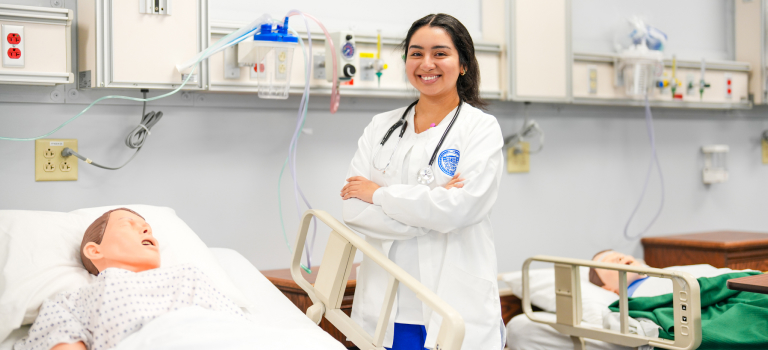Nursing (LPN)

Nursing (LPN)
The nursing curriculum of the Quincy College Certificate of Completion in Practical Nursing, is based on sound educational principles and follows the mission, philosophy and outcomes identified for the program. The curriculum design is a blend of Nurse of the Future Competencies and a concept based curriculum. The Nurse of the Future Competencies provide the overarching framework for the curriculum and serve as the major program concepts. The curriculum is delivered through an active learning environment that encourages individual student contributions as they learn and achieve. This requires faculty to be actively involved with students in the classroom through mutual respect, responsibility, and collaboration. The teaching skills needed to deliver the concept-based curriculum require consideration of the diverse student backgrounds and perspectives that are represented in our student body.
The faculty also believes in delivering a curriculum that is evidenced-based, representing current nursing practice and is at the appropriate level of nursing licensure. As demonstrated by the curriculum materials, the program includes the development of nursing critical thinking/clinical reasoning; leadership and management skills; professional role socialization (including legal, ethical, and professional responsibilities) consistent with the level of licensure; and the ability to delegate, supervise others, and provide leadership. All these components are included in the curricula as required by the Massachusetts Board of Registration in Nursing, 244 CMR 6.04.
Have questions or want to apply for the program? Contact:
Jennifer Davis, Office of Admissions
jdavis@quincycollege.edu | (617) 984-1715
Academic Division of Nursing Mission
The Mission of the Academic Division of Nursing is congruent with the mission, values, and goals of Quincy College. The mission of the nursing program is to prepare each graduate for success on the National Council Licensure Examination (NCLEX®) to ensure graduates safely practice nursing with professional competence and care holistically for individuals from culturally diverse backgrounds. The graduate will function as an integral member of the inter-professional team with a commitment to educational advancement and lifelong learning.
The Academic Division of Nursing at Quincy College provides clinical education for our students at top healthcare facilities and in community settings in Massachusetts including:
- Beth Israel Deaconess Plymouth
- Boston Medical Center
- Bournewood Hospital
- Hancock Park Rehabilitation & Nursing Center
- Hebrew Rehabilitation Center
- Life Care Center of Plymouth
- Quincy Public Schools
- Spaulding Rehabilitation Hospital
- South Shore Hospital
- Walden Behavioral Care
Board of Registration in Nursing
The Quincy College Certificate of Practical Nursing (PN) program has full approval granted by the Massachusetts Board of Registered Nursing (MABORN). For more information, contact MABORN on the web at http://www.mass.gov/dph/boards or at 250 Washington Street, Boston, MA 02108, or by phone (800) 414-0168 or Alt. (617) 973-0900.
Effective 1/16/24, the PN nursing programs at Quincy College at the Quincy/Plymouth campuses located in MA is a candidate for initial accreditation by the Accreditation Commission for Education in Nursing. This candidacy status expires on 1/16/25. Visit http://www.acenursing.org for more information.
NCLEX-PN® Pass Rates for Quincy Campus
| Year | PN Graduates | First-Time NCLEX-PN® | MA Pass rate | National Pass Rate (U.S. Educated) |
|---|---|---|---|---|
| 2020 | 11 | 100% | 91% | 84% |
| 2021 | 9 | 100% | 88% | 80% |
| 2022 | 11 | 100% | 86% | 80% |
| 2023 | 16 | Pending | Pending | Pending |
NCLEX-PN® Pass Rates for Plymouth Campus
| Year | PN Graduates | First-Time NCLEX-PN® | MA Pass rate | National Pass Rate (U.S. Educated) |
|---|---|---|---|---|
| 2020 | 6 | 100% | 91% | 84% |
| 2021 | 4 | 100% | 88% | 80% |
| 2022 | 5 | 83% | 86% | 80% |
| 2023 | 7 | Pending | Pending | Pending |
Academic Division of Nursing
Nursing (LPN) Courses
-
Code
Course
Credits
-
- PNU 145
Fundamentals of Nursing I
- 5
Prerequisites with a required grade of “C” (73%) or better:
• MAT 103 College Algebra
• HSC 149 Applied A&P for Healthcare Professionals
Co-requisites with a required grade of “C+” (77%) or better:
• PNU 101 Growth & Development
• PNU 131- Nutrition
• PNU 141 Microbiology
• PNU 111 Human Behavior -
- PNU 146
Fundamentals of Nursing II
- 5
Pre-requisites with a required grade of “C+” (77%) or better:
• PNU-145
• HSC 149 Applied A&P for Healthcare Professionals
• MAT 103 College Algebra
Co-requisites with a required grade of “C+” (77%) or better:
• PNU 101 Growth & Development
• PNU 131- Nutrition
• PNU 141 Microbiology
• PNU 111 Human Behavior -
- PNU 153
Concepts of Adult Health Nursing I
- 8
Pre-requisites with a required grade of “C+” (77%) or better:
• PNU-145
• PNU-146 -
- PNU 154
Concepts of Adult Health Nursing II
- 8
Pre-requisites with a required grade of “C+” (77%) or better:
• PNU-145
• PNU-146
• PNU-153 -
- PNU 157
Practical Nursing across the Continuum
- 7
Pre-requisites with a required grade of “C+” (77%) or better:
• PNU-145
• PNU-146
• PNU-153
• PNU-154
Admission Requirements
Fall 2024 Admissions: Must be completed PRIOR to submitting an application
- Proof of high school/GED completion
- Attend a Nursing Information Session
- TEAS exam
- MAT 103: College Algebra (No Substitutions)
- HSC 149: Applied Anatomy & Physiology (or A&P I & II can substitute)
Prerequisites
- Accepted with a grade of C (73+) or better
- All pre-requisites must be completed by May 2024
- Some prerequisites can be satisfied upon a transfer evaluation of prior high school or college coursework
Co-Requisites (preference will be given to those who have these completed PRIOR to the program)
- PSY 101: General Psychology
- PNU 111: Human Behavior
TEAS Exam
- MUST be taken on campus at Quincy College.
- Maximum of three attempts allowed per academic year (must wait 30 days prior to retesting)
- Required scores in each section. These scores must be met to be eligible.
Math 50% English 55% Reading 65% Science 35%
Nursing Application
Applications for the Fall 2024 semester will be open in October 2023. Contact admissions@quincycollege.edu for more information.
Students may take pre-requisite and co-requisite courses now in preparation for the Nursing programs. To learn more about pre-requisite and co-requisite courses, please contact Admissions Associate Jennifer Davis at jdavis@quincycollege.edu | (617) 984-1715
If you do not attend an Information Session and/or your application is Incomplete (missing any of the materials required below), you will NOT be considered for admission to the PN program.
The Academic Division of Nursing will evaluate only those applicants who took the TEAS test on or after September 1, 2022. If an applicant fails to meet the minimum required scores indicated above, they may take the TEAS test a maximum of three times in an academic year (September 1st through August 31st). Applicants must wait 30 days prior to each retest. Applicants will be required to retake all four sections, and the highest scores will be utilized. More information regarding the TEAS test is available at www.atitesting.com.
Please Note: At this time, Quincy College’s Nursing program can only accept applicants who are Massachusetts residents due to onsite program requirements.
You might also be interested in...
-

Admissions
Becoming a Quincy College student is as simple as meeting with one of our Admissions Associates.
-

Nursing (RN)
Quincy College’s Associate in Science Degree in Nursing program is a blended, Nurse of the Future competencies and concept-based curriculum.
-

Certified Nursing Assistant
The Certified Nursing Assistant Program prepares students to take the MA State CNA exam & become a member of (DPH) the professional registry.
-

Phlebotomy
Quincy College's Phlebotomy Program trains students to perform both routine and challenging venipunctures & capillary skin punctures on adults.




